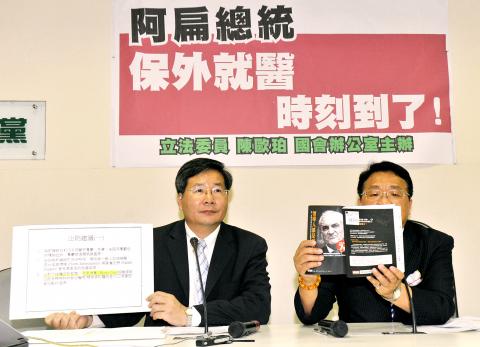Former president Chen Shui-bian (陳水扁) is suffering from various ailments, and it would not be good for him to return to prison, his attending physician told lawmakers yesterday.
Chou Yuan-hua (周元華), a psychiatrist in charge of Chen’s care at Taipei Veterans General Hospital (TVGH), added that it would be better for the former president to be looked after at home or to stay in a hospital that has a psychiatry department near his home.
When Democratic Progressive Party (DPP) Legislator Hsiao Bi-khim (蕭美琴) asked if there was a possibility that Chen might commit suicide if he were sent back to Taipei Prison, Chou said: “There is definitely a possibility.”

Photo: Chen Chih-chu, Taipei Times
Chou was giving a report on the former president’s current condition at a meeting of the legislature’s Foreign Affairs and National Defense Committee.
After nasal septum deviation surgery recently, Chou said Chen’s sleep apnea has improved, but there was a high risk of a relapse.
Chou added that Chen’s speech impediment had not visibly improved over the past half year. Two brain magnetic resonance imaging (MRI) exams found that he has cerebral atrophy and hand tremors, and doctors are still monitoring these conditions.
While there seem to be signs that Chen is recovering from severe depression, he still suffers from anxiety and insomnia, Chou added.
“I know that Taipei Prison has tried to improve Chen’s environment in the prison, but the treatment of severe depression should factor in the atmosphere and the patient’s mental state. I believe it would not be good for Chen to go back to prison now,” Chou said.
TVGH superintendent Lin Fang-yue (林芳郁) told the meeting that TVGH is a hospital for the treatment of severe and emergency conditions. While Chen’s immediate symptoms have been treated, depression is a chronic disease that requires lengthy treatment in a psychiatric ward.
Despite the doctors’ report, Deputy Minister of Justice Chen Ming-tang (陳明堂) reiterated that Chen’s current medical treatment is sufficient to care for his long-term health, and his condition does not qualify him for medical parole.
DPP Legislator Chen Ting-fei (陳亭妃) said it was very clear that the medical report says Chen should be cared for at home and that he should not go back to the prison, but the ministry does not seem to comprehend the report.
Chen Ming-tang said the ministry would evaluate TVGH’s report and make a decision in three weeks.
The former president is serving a 20-year sentence for corruption.

The High Prosecutors’ Office yesterday withdrew an appeal against the acquittal of a former bank manager 22 years after his death, marking Taiwan’s first instance of prosecutors rendering posthumous justice to a wrongfully convicted defendant. Chu Ching-en (諸慶恩) — formerly a manager at the Taipei branch of BNP Paribas — was in 1999 accused by Weng Mao-chung (翁茂鍾), then-president of Chia Her Industrial Co, of forging a request for a fixed deposit of US$10 million by I-Hwa Industrial Co, a subsidiary of Chia Her, which was used as collateral. Chu was ruled not guilty in the first trial, but was found guilty

DEADLOCK: As the commission is unable to forum a quorum to review license renewal applications, the channel operators are not at fault and can air past their license date The National Communications Commission (NCC) yesterday said that the Public Television Service (PTS) and 36 other television and radio broadcasters could continue airing, despite the commission’s inability to meet a quorum to review their license renewal applications. The licenses of PTS and the other channels are set to expire between this month and June. The National Communications Commission Organization Act (國家通訊傳播委員會組織法) stipulates that the commission must meet the mandated quorum of four to hold a valid meeting. The seven-member commission currently has only three commissioners. “We have informed the channel operators of the progress we have made in reviewing their license renewal applications, and

Taiwan People’s Party (TPP) Chairman Huang Kuo-chang (黃國昌) yesterday appealed to the authorities to release former Taipei mayor Ko Wen-je (柯文哲) from pretrial detention amid conflicting reports about his health. The TPP at a news conference on Thursday said that Ko should be released to a hospital for treatment, adding that he has blood in his urine and had spells of pain and nausea followed by vomiting over the past three months. Hsieh Yen-yau (謝炎堯), a retired professor of internal medicine and Ko’s former teacher, said that Ko’s symptoms aligned with gallstones, kidney inflammation and potentially dangerous heart conditions. Ko, charged with

Taiwan-based publisher Li Yanhe (李延賀) has been sentenced to three years in prison, fined 50,000 yuan (US$6,890) in personal assets and deprived political rights for one year for “inciting secession” in China, China's Taiwan Affairs Office spokesman Chen Binhua (陳斌華) said today. The Shanghai First Intermediate People’s Court announced the verdict on Feb. 17, Chen said. The trial was conducted lawfully, and in an open and fair manner, he said, adding that the verdict has since come into legal effect. The defendant reportedly admitted guilt and would appeal within the statutory appeal period, he said, adding that the defendant and his family have